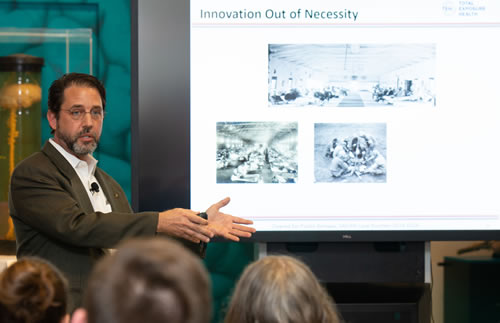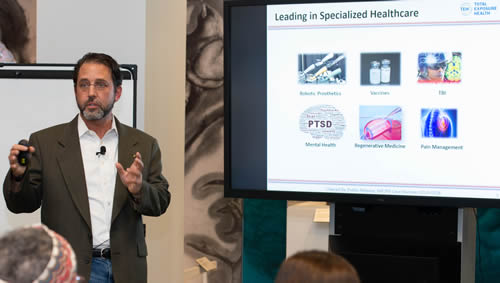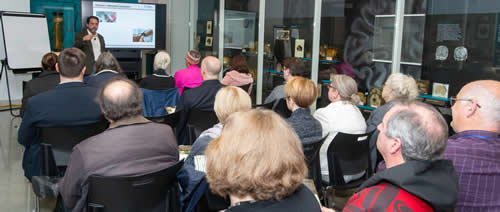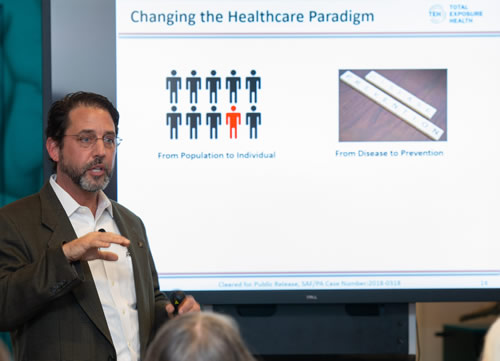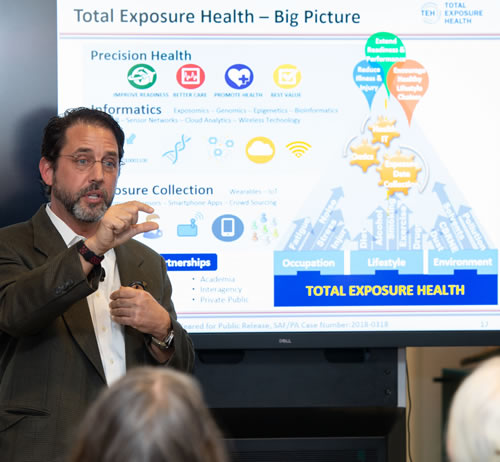Precision Medicine is Aim of "Total Exposure Health" Initiative, Says Air Force Medicine
By Lauren Bigge
NMHM Public Affairs Coordinator
An initiative called Total Exposure Health will revolutionize military health and medicine in the years to come, Richard Hartman, Ph. D., chief strategist from the Office of the Air Force Surgeon General, told the Medical Museum Science Café audience on April 24 at the National Museum of Health and Medicine (NMHM), a Department of Defense (DoD) museum.
"The significant benefit of what we see in military medicine is through the battlefields and conflicts," Hartman said. "Typically those innovations come out of necessity. The EMS [which is emergency medical services] systems we have right now, from the point where the patient is injured all the way to the point that they get that next portion of healthcare, was created and improved through the military."
He noted that contemporary military medicine areas of focus for innovation are robotics and prosthetics, vaccines, pain management, traumatic brain injury, regenerative medicine, and post-traumatic stress disorder. "We're more leaders in specialized medicine now," Hartman said. "How do we, as a military enterprise, really shape healthcare the way it was shaped back in the past?"
The military can focus on beneficiaries, not just service members, in personalized healthcare. It's an opportunity to bring a common vision into one unified thought process: Total Exposure Health (TEH). The goal is to understand the effects of exposures on a patient's health throughout their life; identify diseases at the molecular level before onset; have available rapid interventions that support medical care; and reduce disabilities through prevention. "What if we could demonstrate significant cost savings and efficiencies? We have to change the paradigm," he said, emphasizing a shift from population to individual healthcare, and from disease to prevention.
"The exposure factor has been overlooked in military health and medicine," said Hartman. An individual's exposure experience may include food, accidents, chemicals, noise, and more. The emerging TEH system takes into account workforce, environmental and lifestyle exposures at the individual genomic level, genetic variation, then uses advances in science and technology as well as informatics to prevent disease and improve the health and performance of active duty personnel, veterans, civilians and their families.
The TEH relies first on genomic research for understanding of health risks; genomics is a new science that deals with the discovery and noting of all the sequences in the entire genome of a particular organism. It also relies on mobile technology sensors and big data tools. The long-term goal is to link all of the data with individual medical records.
The military needs to know what medical and healthcare concerns may be anticipated because "it allows us to make good policy and resource decisions," Hartman said.
He said that it's important to take genetic variance into account, because it shows that individuals are unique. "This information can also be used to protect health and enhance performance, and in the military that's what we're here for," Hartman said. "If we can take what we're learning from enhancing performance – that can be translated into the public sector, and or the commercial sector."
Hartman noted it cannot be accomplished without a multi-sector cooperative that involves professional and academia partners, technical partners, industry partners and federal agencies such as the Defense Health Agency, of which NMHM is an element.
"It will be exciting to see an increase in innovative technologies to support Air Force Medicine's new approach toward improving the health of the individual through Total Exposure Health," said Andrea Schierkolk, NMHM public programs manager.
NMHM's Medical Museum Science Cafés are a regular series of informal talks that connect the mission of the Department of Defense museum with the public. The NMHM was founded as the Army Medical Museum in 1862 and is an element of the Defense Health Agency Research and Development Directorate. For more information on upcoming events, call 301-319-3303 or visit www.medicalmuseum.mil.
